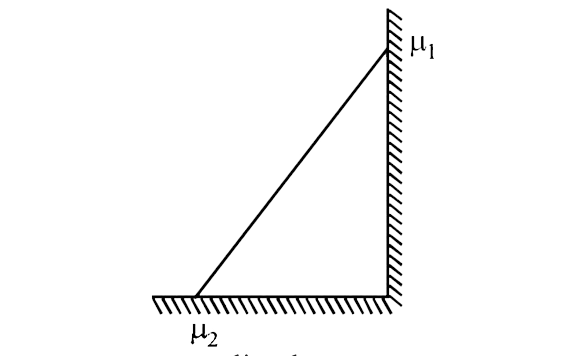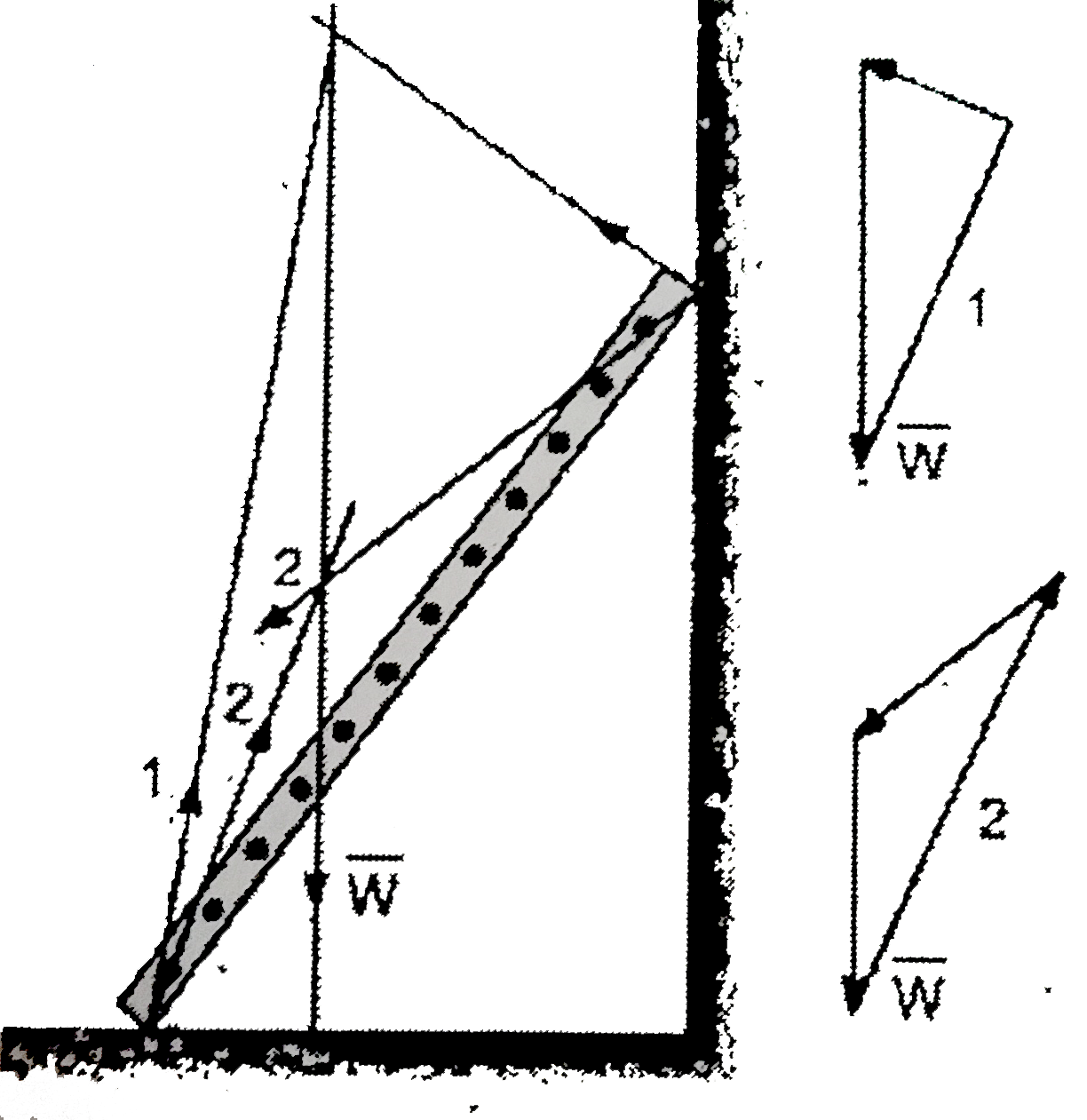A ladders is more likely to slip when a person is near the top than when he is near the bottom.
The friction between the ladder and floor decreases as he climbs up.
Statement-1 is True, Statement-2 is Ture , Statement -2 is a correct explanation for statement -1.
Statement-1 is True, Statement-2 is True , Statement-2 is NOT a correct explanation fro Statement -1.
Statement-1 is True, Statement-2 is False.
Statement-1 is False, Statement-2 is True.
The correct Answer is:C
As the person climbs up, normal reaction and friciton between the ladder and the wall both increase. This decreases normal reacction from the floor. Decreasing limiting value of friction there. This increases the possibility of the ladder slippling.
Similar Questions
A light ladder rests onn te rough floor of a room, leaning against a smooth wall. The ladder touches the wall at height h above the floor. A man climbs up the ladder until the base of the ladder is on the verge of slipping. The coefficint of static friction between the foot of the ladder and floor is μ.
(a) What is the horizontal distance moved by the man?
(b) Solve part (a) if the ladder is uniform and has the same weight as the man and the base of the ladder is at a distance l from the wall.View SolutionA uniform ladder of length L and mass m1 rests against a frictionless wall. The ladder makes an angle θ with the horizontal. (a) Find the horizontal and vertical forces the ground exerts on the base of the ladder when a firefighter of mass m2 is a distance x from the bottom. (b) If the ladder is just on the verge of slipping when the firefighter is a distance d from the bottom, what is the coefficient of static friction between ladder and ground?
View Solution
Knowledge Check
- Question 1 - Select One
Assertion: A ladder is more apt to slip, when you are high up on it than when you just begin to climb.
Reason: At the high up on the ladder, the torque is large and on climbing up the torque is small.AIf both assertion and reason are true and reason is the correct explanation of assertion.BIf both assertion and reason are true but reason is not the correct explanation of assertionCIf assertion is true but reason is false.DIf both aseertion and reason are false. - Question 2 - Select One
A person is sitting near the edge fo a rotating platfrom when he walks towards the centere, then:
AMoment ofinertia ofsystem increasesBAngular velocity ofplatform decreasesCAngular velocity ofplatform increasesDAngular velocity of platform remains unchanged - Question 3 - Select One or More
In the figure, a ladder of mass m is shown leaning against a wall. It is in static equilibrium making an angle θ with the horizontal floor. The coefficient of friction between the wall and the ladder is μ1 and that between the floor and the ladder is μ2. the normal reaction of the wall on the ladder is N1 and that of the floor is N2. if the ladder is about to slip. than
 Aμ1=0,μ2≠andN2tanθ=mg2Bμ1≠0,μ2=0andN1tanθ=mg2Cμ1≠0,μ2≠0andN2=mg1+μ1μ2Dμ1=0,μ2≠0andN1tanθ=mg2
Aμ1=0,μ2≠andN2tanθ=mg2Bμ1≠0,μ2=0andN1tanθ=mg2Cμ1≠0,μ2≠0andN2=mg1+μ1μ2Dμ1=0,μ2≠0andN1tanθ=mg2
Why does a person feel pain when he stands on a pile of gravel than when he stands on a bed of sand?
View SolutionA ladder rests on the floor of a room, leaning agains a wall. If the coefficient of static friction between the ladder the floor is μf and that between ladder and is μw, what is the minimum angle θ that the ladder can make with the floor if the ladder is not to slip? Assume that the mass of the ladder is distributed uniformly.
 View Solution
View SolutionA ladder 5 m long is leaning against a wall. The bottom of the ladder is pulled along the ground,away from the wall at the rate of 10 cm/s. How fast is the angle between the ladder and the ground decreasing when the foot of the ladder is 2 m away from the wall?
View SolutionWhy is the pressure on the ground more when a man is walking than when he is standing?
View SolutionA ladder of mass 10 kg is resting with its top end touching a vertical wall and the bottom end on the floor. If the angle between the ground and the ladder is 45°, find the horizontal force required at the bottom to prevent the ladder from sliding. Neglect friction and take g=10ms−2.
View Solution

